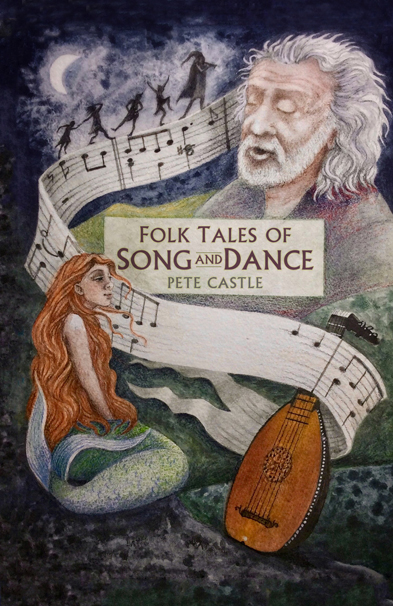THE HISTORY PRESS ISBN 0978 07509 9509 2
Review 1 by Donald Smith; Chief Exec of TRACS (Traditional Arts & Culture, Scotland
Pete Castle’s new book is a delightful tug-of-war.
On the one side is a consummate performer- storyteller and balladeer. He comes away with some fluent, focused and finely tuned inputs. I especially commend the Cornish offerings (eg ‘The Mermaid and the Man of Cury’), the Welsh tales (eg ‘Ffarwel Ned Pugh’ and ‘The Fairy Harp’), and the ballads, not least ‘Jack Horner’s Magic Pipes’ which must surely have been a broadsheet and/or chapbook classic.
Then at the other end of a firmly held rope is Pete Castle, editor, pundit and good crack. He brims over with information, anecdotes and informative titbits. Its like after the gig, when you get round a table with fellow performers to share a wealth of lore….till ale overtakes the learning.
Those two sides come together beautifully through Pete’s eye for ‘the song within the story’ – surely one of the greatest pleasures of oral narrative, and often a sign of genuine antiquity. Check out Pete’s song for ‘Mossycoat’, the backbone song in ‘Orange and Lemon’ (Orangie an Aipplie for the Scots), and the apparently simple songster who steals the show in ‘The Man Who Stole the Parson’s Sheep’.
I humbly submit though that Pete misses a trick with ‘The Hunchback and the Fairies’ as the Scots Traveller version- ‘Monday, Tuesday’- bubbles on a wee sang, the words of which are graciously extended to ‘Monday, Tuesday, Wednesday, Thursday’. Still enough to get the little people toe-tapping at Midsummer!
You will get lots of enjoyment and good ideas from Pete Castle’s Folk Tales of Song and Dance. To coin a phrase, it offers an unbeatable blend of Fact and Fiction.
Review 2 by Lynne Cullen (February, 2021) Storyteller, USA
While writing this review of Folktales of Song and Dance, by musician/storyteller Pete Castle, I have been listening to: ‘Ffarwel Ned Pugh’, ‘Jack Orion’, ‘Gallows Pole’ (the Led Zeppelin version), ‘Raggle Taggle Gypsy’, and The Violin Sonata in G minor (Devil’s Trill Sonata) by Giuseppe Tartini (1692–1770).
That’s part of what makes this book such fun.
The author has collected roughly fifty folktales, ballads, and lore from the British Isles and Ireland (with two exceptions). They share one thing in common: all are connected to music.
The collection opens and closes with a two-part tale of the legendary Welsh bard Glasgerion (in which a post-concert sexual assignation goes tragically wrong). The stories are organized by subject. For example: minstrels; underground tunnels; the faerie folk; the Devil; compulsive dancing, and musical instruments constructed from body parts (yes, that’s a thing).
The borders between folktales and folk music have always been porous. Some of the stories were originally ballads; other stories inspired ballads.
At the end of each tale, the author explains where he came by the story, and includes information about the songs and ballads, making it easy to find and enjoy the music online, or to play and sing the tunes yourself if you’re so inclined.
Thus there is an interactive quality which I found very entertaining, though the reader will get just as much pleasure from reading the book while sitting in a comfy chair.
The author begins each selection of stories-on-a-theme with a brief discussion of the history and possible origins of that theme. These little introductions are written in an intimate, conversational style, making the reader feel as though they are actually in the presence of an affable speaker in a pub or at a casual lecture.
The book has a beautiful, painted (or is it pastel?) cover by Katherine Soutar, and is peppered with quirky illustrations by the author.
I read the entire book in three hours; it was a brisk read, and never once was I in danger of being bogged down, bored or distracted.
I enjoyed the Afterward, in which the author proposes that folktales are still very much alive and constantly evolving, and that new stories are always being generated by experience. He elaborated on this idea with amusing anecdotes about his own adventures as a touring storyteller and bard.
In these days of restricted travel, I recommend this book as an excellent way to transport yourself to other times and places without having to leave the house. Once you can travel again, you may be eager to take yourself to the places from which the stories came.
I had a good journey.

